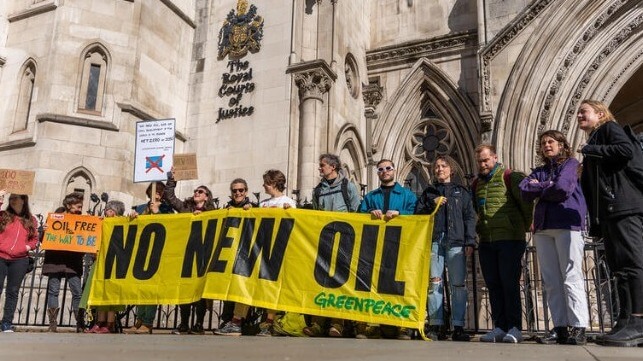Greenpeace Wins Court Approval for Lawsuit Against UK E&P Leasing

A UK court has allowed Greenpeace to proceed with a judicial review of a planned auction round for North Sea oil and gas leasing, the environmental group announced Wednesday. The approval is the first step in the British legal process for a lawsuit challenging a government decision.
In December, Greenpeace UK filed a lawsuit with the London High Court in an attempt to reverse government plans to issue up to 130 new E&P licenses in the UK North Sea. By law, the government is required to perform an environmental assessment before issuing new licenses; Greenpeace contends that it shortchanged the review process by ignoring emissions that would be generated downstream by burning the oil and gas extracted from the lease blocks. Instead, according to the advocacy group, the government based its environmental impact assessment solely on emissions from production - a segment which accounts for only 20 percent of the total lifecycle emissions profile of the projects.
On Wednesday, the High Court granted permission for Greenpeace to pursue a full judicial review of the government’s decision to omit the effects of combusting the oil and gas that would be extracted in the new licensing round.
“This verdict is the first real setback for the government’s reckless oil and gas licensing round. Ministers will now be forced to justify in front of a judge why they want to unleash a new drilling frenzy in the North Sea against the advice of leading scientists and the UN chief, without assessing the climate impact," said Philip Evans, Greenpeace UK's climate campaign chief.
Friends of the Earth and Uplift have filed similar lawsuits.
The UK government began a course change on oil and gas in the spring of 2022, when the Russian invasion of Ukraine sent prices soaring. The administration of then-Prime Minister Boris Johnson announced a "new lease of life" for offshore E&P, with a particular eye towards substituting imported LNG with domestically-produced natural gas. An estimated 560 billion cubic meters of gas remains in the UK North Sea, and the government announced plans to actively support its use. Planned support measures included an offshore licensing round; an accelerated permitting process to "take years off the development" for new offshore projects; and investing in carbon-capture clusters to offset the climate impact of the activity.

that matters most
Get the latest maritime news delivered to your inbox daily.
The prime minister has changed twice since Johnson's announcement, but the commitment to leasing remains. Under current Prime Minister Rishi Sunak, the North Sea Transition Authority held a massive lease round on January 15, receiving 115 bids for more than 250 lease blocks.
In addition to its direct climate impact, accelerated oil and gas development could have unintended negative effects for the UK's ambitious offshore wind plans, according to Andrew Reid of the Institute for Energy Economics and Analysis. "About 40% of the oil and gas supply chain has synergies with offshore wind. Both rely on a limited pool of available ports, vessels, and personnel. Stimulating both sectors at the same time will create competition between increasingly scarce resources, limiting availability and driving up costs," he warned in a recent analysis.
